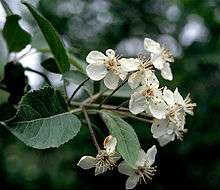Malus fusca
| Malus fusca | |
|---|---|
 | |
| Malus fusca flowers and leaves, at Humboldt Bay National Wildlife Refuge in California | |
| Scientific classification | |
| Kingdom: | Plantae |
| (unranked): | Angiosperms |
| (unranked): | Eudicots |
| (unranked): | Rosids |
| Order: | Rosales |
| Family: | Rosaceae |
| Genus: | Malus |
| Species: | M. fusca |
| Binomial name | |
| Malus fusca (Raf.) C.K.Schneid. | |
| Synonyms | |
|
Synonymy
| |
Malus fusca, with the common names Oregon crabapple and Pacific crabapple, is a North American species of crabapple. [1]
Distribution
It is native to western North America from Alaska, through British Columbia, to northwestern California. It grows in temperate coniferous forest, primarily in the Cascade Range and the Pacific Coast Ranges.[2][3][4][5] [6]
Description
Malus fusca is a deciduous tree up to 13 metres (43 ft) tall. Leaves are up to 10 cm (4 inches) long.
Flowers are white or pale pink, blooming in Spring. The fruits are small round apple-shaped pomes, red, yellow, or yellow-green.[7][8]
Uses
The fruit can be eaten raw or cooked, however it has an acidic flavor raw. The fruit can also be used for extraction of pectin, useful in helping make jams and jellies from other fruits. The bark can be used as a herbal medicine. It is also grown in parks and gardens as an ornamental plant.
Pacific crabapple fruits were prized by indigenous peoples of the Pacific Northwest as a food source, and were gathered all along the coast. As a traditional medicinal plant, infusions of the bark and/or fruit were used, including for stomach disorders, skin and eye infections, and as an analgesic. [9]
The tree was also valued for its tough, resilient wood, used for making implements, and for its bark, used for a wide range of medicinal purposes.[10][11]
References
- ↑ Plants for a Future−PFAF: Malus fusca
- ↑ Biota of North America Program: 2014 county distribution map
- ↑ Biota of North America Program 2014 state-level distribution map
- ↑ Calflora taxon report, University of California, Malus fusca (Raf.) C. Schneider Oregon crab apple, Oregon crabapple
- ↑ University of Washington, Burke Museum
- ↑ Biodiversity of the Central Coast: Pacific Crab Apple
- ↑ Malus fusca'- Árboles ornamentales in Spanish
- ↑ Flora of North America, Malus fusca (Rafinesque) C. K. Schneider, 1906. Oregon or Western or Pacific crabapple
- ↑ University of Michigan at Dearborn: Native American Ethnobotany of Malus fusca (Oregon Crabapple)
- ↑ Deur, Douglas and Turner, Nancy J. Keeping it Living. University of Washington Press, 2005, p. 13.
- ↑ Crabapples - University of Alaska Fairbanks description, photos, recipes
External links
- USDA Plants Profile for Malus fusca (Oregon crab apple)
- CalFlora Database: Malus fusca (Oregon crab apple, Oregon crabapple)
- Jepson Manual eFlora (TJM2) treatment of Malus fusca
- Dreamstime, Royalty Free Stock Images: Photos of the Pacific Crabapple tree (Malus Fusca)
- UC Calphoto Photos gallery — Malus fusca
| Wikimedia Commons has media related to Malus fusca. |
